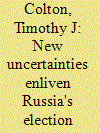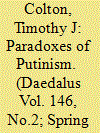| Srl | Item |
| 1 |
ID:
149556


|
|
|
|
|
| Publication |
Oxon, Routledge, 2017.
|
| Description |
212p.pbk
|
| Series |
Adelphi Series no.; 460
|
| Standard Number |
9781138633087
|
|
|
|
|
|
|
|
|
|
|
|
Copies: C:1/I:0,R:0,Q:0
Circulation
| Accession# | Call# | Current Location | Status | Policy | Location |
| 058917 | 327.470477/CHA 058917 | Main | On Shelf | General | |
|
|
|
|
| 2 |
ID:
107228


|
|
|
|
|
| Publication |
2011.
|
| Summary/Abstract |
To embrace curbs on his own power, Putin would need to act as much out of character as Medvedev would need to act against instinct in order to confront his benefactor.
|
|
|
|
|
|
|
|
|
|
|
|
|
|
|
|
| 3 |
ID:
152132


|
|
|
|
|
| Summary/Abstract |
Vladimir Putin's trademark since taking charge of Russia's government almost two decades ago has been stability. He has achieved much in terms of this master goal, including economic and demographic recovery. But development on the part of Russian society has been juxtaposed with growing rigidity and control-mindedness on the part of the state. The accumulation of economic, social, and foreign-policy problems in recent years naturally raises questions about the sustainability of the current regime. Paradoxically, Putin's personal popularity has not always been matched by confidence in his policies, although the 2014 annexation of Crimea from Ukraine gave that confidence a boost. Another paradox is that Russia bucks the global trend that seemingly links social and economic modernization to political democratization. The essays in this issue that follow will probe dimensions of this knot of puzzles.
|
|
|
|
|
|
|
|
|
|
|
|
|
|
|
|
| 4 |
ID:
153783


|
|
|
|
|
| Summary/Abstract |
Under what conditions do individuals withdraw support from dominant parties in nondemocratic regimes? Employing an original panel survey, we measure the same individuals’ support for Russia's dominant party first at the peak of its dominance in 2008 and again shortly after it suffered a cascading defection of regime supporters in 2011–12. This allows us uniquely to explore the microfoundations of theories of regime defection cascades, generally supporting the argument that they involve complex “informational” as well as “reputational” processes. Accordingly, we find that early and eager movers in such a cascade tend to come from less socially vulnerable segments of the population, to have greater need to rely on other people for interpreting events, to believe the regime has lower levels of popular support, and to come from more heterogeneous communities. We find little role for mass media (including social media) or democratizing zeal in driving Russia's regime defection cascade.
|
|
|
|
|
|
|
|
|
|
|
|
|
|
|
|